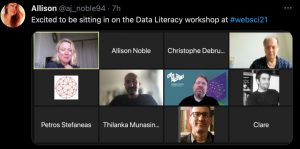Can artificial intelligence be used to undermine elections?
Article by Ben Hawes, Wendy Hall, Matt Ryan
The UK and the US are both heading towards national elections. In the next couple of years almost every major democracy will also hold the most important national elections in their systems. Previous elections in the UK and the US and a referendum in the UK saw spikes in political disinformation online, as well as online exercises in profiling and targeting for the purpose of political influencing.
Continue reading →


